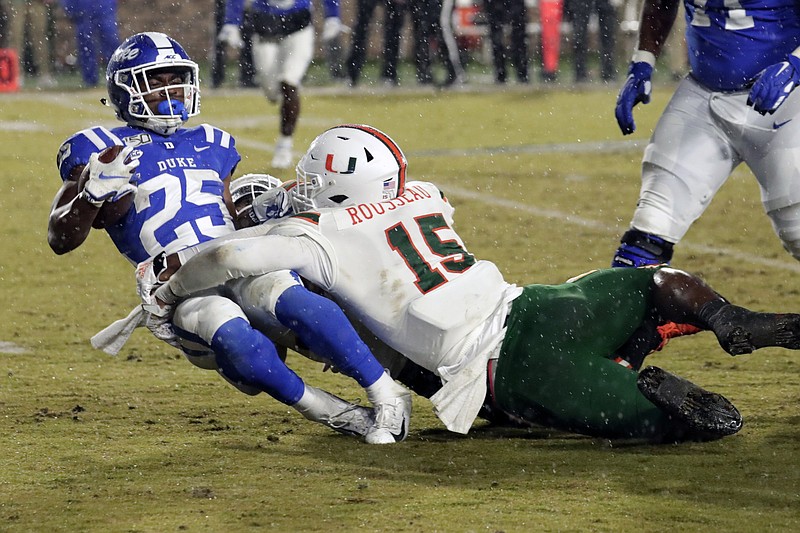Jaelan Phillips and Gregory Rousseau are both long, explosive and relentless. They can blow past linemen, corral quarterbacks and chase down ball carriers. They had similar production (1.5 tackles for loss per game) playing the same position (defensive lineman) at the same school (Miami) wearing the same jersey number (15).
With one significant difference: Phillips put up his monster numbers last year; Rousseau didn't. While Phillips was finally living up to his five-star potential as a second-team All-American, Rousseau was watching from afar as one of the sport's most high-profile opt-outs.
That puts the Hurricanes' two projected first-round picks at the center of a variable that has even confounded ESPN analyst Mel Kiper.
"How you factor in the opt-outs against the guys that played ..." Kiper said, "is going to be the most interesting storyline of this draft."
It's not just Rousseau vs. Phillips. At least a half-dozen first-round hopefuls sat out all of 2020, while a handful of other top-40 prospects left their teams during the regular season.
Their decisions give teams differing, if not incomplete, sets of data. Front offices must evaluate the risks and rewards of a player's potential based on year-old film and pro day performances.
The result is another layer of uncertainty thrown atop an already uncertain process -- an only-in-a-pandemic dynamic with millions of dollars and the future of franchises at stake.
When Leonard Fournette and Christian McCaffrey skipped their bowl games in 2016, no one knew how NFL teams would respond. Would front offices view those choices as understandable business decisions or the red flag of a quitter?
The league shrugged. After both running backs were drafted in the top eight, skipping bowl games became commonplace. But sitting out for an entire year didn't become viable until the pandemic hit.
The reasons differed by player. Opting out allowed Rousseau to help his mother, a nurse, retire early from the covid-19 front lines. Others did so because of money (preseason All-American Jaylen Twyman from Pitt), concern over family members' health (likely first-rounder Caleb Farley from Virginia Tech), lingering midseason injuries (Florida State receiver Tamorrion Terry) or simply to get a jump-start on draft prep (FSU cornerback Asante Samuel).
College football's collective indecision -- like the Big Ten and Pac-12 canceling, then restarting their seasons -- played a significant role, too.
"I didn't feel comfortable going out there to play if they weren't comfortable with us being out there playing," said defensive back Ambry Thomas, a Day 3 prospect from Michigan.
By sitting out, Thomas and others no longer had to accept the extra risk of injury or illness, nor did they have to endure the season's start-and-stop chaos. Instead, without a weekly opponent to prepare for, they could concentrate on themselves.
"Opting out, that gave me time to focus on the things that I needed to improve on my game," said receiver Nico Collins, an early-round prospect from Michigan.
For Collins, that meant refining his route running. For Rousseau, it was increasing his flexibility.
Northwestern's Rashawn Slater said the individualized training he received in Texas "definitely works to my advantage" as he vies to be the first offensive tackle off the board.
"Every single day I was learning something new," Slater said.
Slater believes that knowledge has made him a better player. Maybe it will allow him to contribute more as a rookie or extend his career.
But how much will it help him on draft day?
As talented as some of the opt-outs are, their non-existent 2020 film creates an extra risk teams have to assess.
"A lot can change with the player between 2019 and now," Tampa Bay General Manager Jason Licht said, "especially if they haven't been playing and they've just been training."
Teams don't know how Oregon offensive tackle Penei Sewell, LSU receiver Ja'Marr Chase and Penn State linebacker Micah Parsons would have progressed or regressed from All-American 2019 seasons. They're stuck assessing eight-figure investments based on old information.
"We're talking about top-10, top-15 players that you haven't seen in over a year," ESPN analyst Todd McShay said.
Rousseau is even riskier. Because he only made two appearances during his redshirt 2018 season, his resume consists of 13 games in 2019.
"I don't have a lot of film, but I feel like I showed a lot in the times that I did play," Rousseau said.
His 15 1/2 sacks trailed only Chase Young (Washington's No. 2 overall pick last year). But it's still only one year, making his sample size outdated and small.
That puts a greater emphasis on Rousseau's pro-day performance, which carries another pandemic-related challenge.
Because the traditional scouting combine was canceled, the apples-to-apples comparison of prospects doing the same drills on the same day at the same location no longer exists. Instead, teams must gauge players' measurable statistics on pro days that take place in different conditions across the country.
All the uncertainty leads to an array of yet-to-be-answered questions. Kiper wonders whether the incomplete evaluations will cause some lower-tier opt-outs to drop an entire round. Will the extra risk lead some teams to trade out of this year's draft and into next year when the process, hopefully, is more normal?
"If you have a similar grade on a guy that didn't play in 2020 versus a guy that did play in 2020, you're going to probably go with the guy that played this season," McShay said, "because you just feel like you have more information on him."

